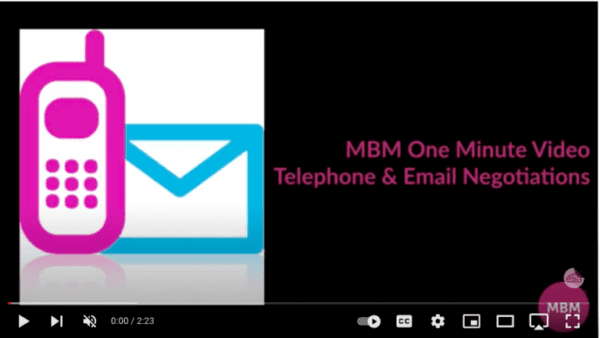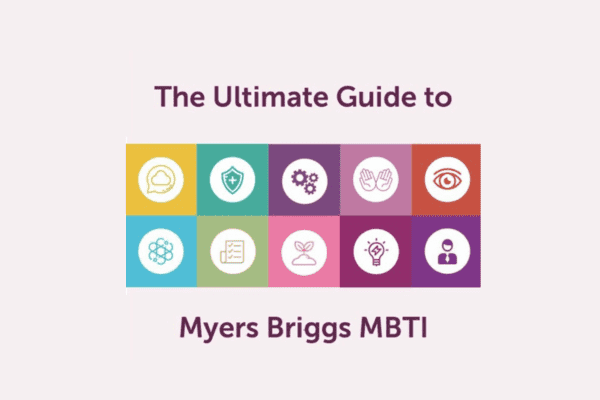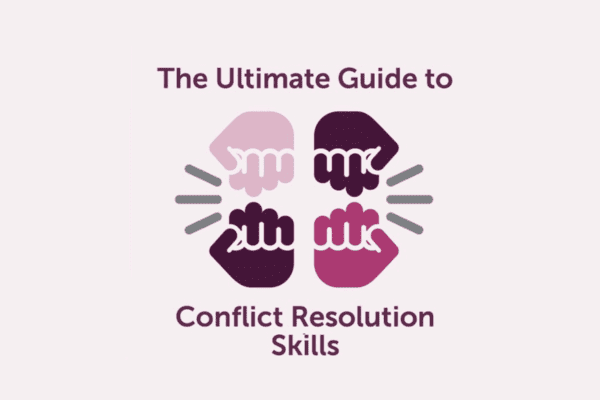What are Negotiation Skills?
Let’s begin by helping with what negotiation skills are not. They are not what most people do – haggling. By starting with a high price and the other person a low price and meeting in the middle, this is haggling. It is a valid form of resolving a conflict. There are 7 others. And another is negotiating.
Negotiating is where two people, or parties, try to resolve a conflict by persuading the other person that they should get more of the deal. Effective negotiators use a toolbox of tools to win. The aim for both parties is not always to achieve a win-win outcome. The difference between a negotiation and a haggle is that a haggle is one-dimensional. Normally it’s about price. However, a negotiation contains more than one dimension.
“negotiation” noun 1: discussion aimed at reaching an agreement.
This Ultimate Guide to Negotiation Skills will take you on a learning journey to equip you with all the skills you need to effectively negotiate and therefore commercially succeed especially with the major multiple supermarkets and other buying groups.

This Ultimate Guide will Cover:
- Introduction to Negotiation Skills
- Why Negotiation Skills Are Important
- 6 Key Negotiation Skills
- Negotiation Strategies
- Negotiation Styles
- Effective Negotiation Techniques
- Negotiation Techniques Tradeables
- Negotiation Techniques for Account Managers
- Our Conclusion for Skills in Negotiating
- Further Reading and Resources for Skills in Negotiating
1) Introduction
Let’s begin our Ultimate Guide by painting a picture of what negotiations can look like and some important elements to set the scene for further negotiation skills and techniques.
You have spent three whole days carefully crafting and preparing your presentation and pitch to your Buyer. You are primed and ready for all the incisive questions the Buyer will ask. After all, this is one of the largest, most sophisticated supermarket chains in the country. They are going to be tough, focused and keen to see the wonderful new products you have to sell.
#1: Busy Buyers
A 45-minute wait in Reception. Strange they always run late? But hey they are busy, busy people, right? The Buyer finally sees you and you begin your pitch. As you reach the big reveal of your fantastic new products that are going to make the Buyer lots and lots of money they deploy the ‘Oliver Twist’ tactic on you. With a bored expression and a loud yawn, they lean right back in their chair and say……… ‘No’ and ‘I want more’ sometimes (rarely) followed with a little ‘please’ added in for good measure.
#2: Discussion Aimed at Reaching Agreement
It’s hardly a ‘discussion aimed at reaching agreement’. It seems more like a demonstration of power and potential intimidation. Welcome to the world of supermarket negotiation.
Therefore, as a result, you can spend (lots of) your money on a myriad of solid, theory-heavy, intellectually robust classic negotiation courses. Indeed they may qualify you to negotiate global peace accords but they will certainly not equip you for the world of supermarket negotiation. Luckily, that’s where this guide comes in.
#3: Win-Win or Win-Lose?

All classic negotiation courses are predicated on the concept of ‘Win-Win’. Hence, as a result, both sides work together to reach a mutually acceptable agreement. Therefore it relies on both parties being willing to reciprocate each other’s offers and actions and be logical, commercially focused and principled in their dealings with one another.
The UK wine buyer visiting one of the premier Chateaux in Bordeaux. Invited in front of the massed ranks of the whole estate to taste the new proudly presented vintage. A respectful hush falls as the buyer slowly looks at, sniffs and then tastes the wine……………… A long thoughtful pause and then the considered, logical and principled verdict……… ‘Very pleasant but it’s lacking a touch of margin…’
How do you then negotiate with a party that isn’t necessarily logical, reciprocal, honest or even commercial in their words and actions? It can certainly be about Win-Win but the first rule of negotiating with the supermarkets is don’t fall for their ‘I Win, You Lose’ negotiation tactics, tricks and games.
2) Why Negotiation Skills Are Important
There are several reasons why negotiations in business are so important.
Professor Michael Wheel at Harvard Business School Online is a renowned negotiation skills expert and shares the following explanation of why negotiation skills are so important.
“Enhancing your negotiation skills has an enormous payoff. It allows you to reach agreements that might otherwise slip through your fingers. It also, in some cases, allows you to resolve small differences before they escalate into big conflicts.” (“Negotiating Mastery” Online Course)
Let’s see where these negotiations take place.
#1: Handle Contract Negotiations
First, we have all had the experience of negotiating to get a better deal when looking to sign a new contract with a future employer. Obviously, everyone wants to get the best out of the deal, in terms of salary and benefits.
These contract negotiations are also important with suppliers, customers, and for mergers.
#2: Managing Conflict between Team Members
Next, this is another common experience many of us have had. You have to handle the resolution of conflict within the team. And, it’s not always an easy task. Knowing how to negotiate, to achieve a result that suits everyone involved, means you are less likely to see the conflict rear its ugly head again.
#3: Sales Proposals with Potential Customers or Suppliers
Now, we negotiate regularly to get the best deals possible with potential suppliers and customers. Think back to the example given in the introduction and the preparation you do for a sales pitch. This all works towards achieving the best outcome for your company moving forward. Nobody wants to end up in the Lose side of the “Win-Lose” option.
#4: Career Advancement
Additionally, we have sat down with our employers to negotiate the terms of our contract renewal during promotion opportunities and chances for salary increments. This is where we show the value we add to the company through our contributions and add a career advancement “price tag”.
#5: Adapt to Business Changes
Finally, we negotiate with stakeholders when a major change happens in our business or industry. Think back to the days of the pandemic and the level of negotiation required to keep your business going. Probably you negotiated with owners/investors, staff, and even customers to keep the ship afloat. That all makes the challenges of negotiation worthwhile when you see the results achieved.
As you can see, these reasons highlight the importance of negotiations in business.
What is the Purpose of Negotiation?
Understanding the importance of negotiations in business is important. Also, it’s useful to understand the PURPOSE of negotiation. The UN (United Nations) define the purpose as:
“Negotiation is well known and practised in all fields of human activity. It is a way of settling disputes without fighting, a way of making joint decisions when those who are making decisions hold different views or a way of achieving your own objectives despite other participants having different objectives.”
In terms of developing our negotiation skills, leaders need to understand that negotiations happen in all shapes and sizes throughout our day at work. We need to have the right skills to handle any challenge that comes our way.
3) 6 Key Negotiation Skills
We have looked at why negotiation skills are important, as well as the purpose of negotiations in this ultimate article. Now, let’s focus on key negotiation skills we need to make these interactions effective.
In a 2023 article “6 Negotiation Skills All Professionals Can Benefit From” for Harvard Business School Online, Marketing Specialist, Kelsey Miller, identified 6 key negotiation skills that all managers should have for business. She identifies the following:
- Communication
- Emotional Intelligence
- Planning
- Value Creation
- Strategy
- Reflection
Let’s have a look at each of these to see how they contribute during negotiations.
#1: Communication
Obviously, communication is the first vital skill required to negotiate effectively. This includes giving and receiving information, so active listening is also an important element. It also includes your non-verbal communication during interactions.
Your communication during negotiations needs to be:
- Clear
- Concise
- Relevant
- Achievable
- Realistic
- 2-way interactions (giving and receiving)
Once you include these elements, your communication approach covers the key areas needed to improve your negotiations.
#2: Emotional Intelligence
Next, practice the different elements of Emotional Intelligence for better results when negotiating. Daniel Coleman’s EI theory covers 5 key areas:
- Self-awareness
- Self-regulation
- Motivation
- Empathy
- Social Skills
For negotiations, these different elements allow us to manage our own emotional responses, understand the emotions of others during the interactions, and being able to properly adapt in different social situations.
#3: Planning
Ideally, you have time to prepare and plan for all possible negotiations. Depending on the scenario, you have weeks for some, but maybe only hours for others. Either way, plan in advance for all upcoming negotiations. Avoid last-minute preparation. Your negotiations won’t achieve the desired results.
Instead, know your expected outcome and result. Also, have answers ready for potential questions that can come up. Know your options inside and out. Prepare, prepare, prepare!
#4: Value Creation
Here, you create options that add more value to everyone involved in the negotiations. You show options that develop better terms for all, as well as ensuring you achieve your expected outcome. For example, during contract negotiations, add additional non-monetary benefits that appeal to the needs and wants of those reviewing the employment or sales contract. An example is better health insurance or a living or travel allowance.
I know these benefits have worked for me in the past and add value even without a dollar sign directly attached.
For customers or suppliers, this can be a better payment option for products or services.
#5: Strategy
In addition to planning, you need a strategy. This is your selling technique and approach. Also, it’s about how you can overcome potential barriers during the negotiations.
Take conflict resolution for example. You approach the conversation understanding the following:
- Know your role, as a mediator.
- Understand the perspective of all involved.
- Create a middle ground that everyone can agree to.
- Complete the negotiations until an agreement is reached.
You need to know what you will and will not compromise on in order to reach an agreement.
#6: Reflection
Finally, review your negotiations to identify strengths and areas of improvement. Learn from experience what to keep in your toolkit and what to enhance. It’s essential that everyone learns from less successful negotiations and you improve your approach. Experience, practice, preparation and training all help to make this happen. We have a great list of MBM resources available later in the article.
4) Negotiation Skills Strategies
In addition to key negotiation skills, it’s important to have a good strategy when heading into any type of negotiation. Let’s take a look.
Click the image below for a higher resolution:
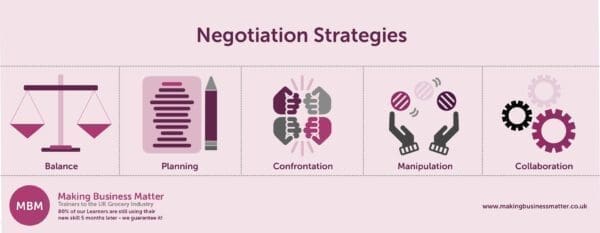
Why then do supermarket Buyers adopt such on the face of illogical, strange, sometimes weird games and tactics as a basis of their negotiations? The answer is as simple as it is blindingly obvious: Because it works!
But why does it work? Well, there are numerous reasons which are explored in-depth in this ultimate guide. And here is one…
#1: Balance of Power
At its most fundamental it comes down to the Balance of Power. The top 6 supermarket multiples account for 83% of UK grocery spend (Kantar Worldpanel 21.5.17). Therefore anyone selling to a Tesco potentially has 28% or more of their business tied up with a single customer.
However to Tesco with UK sales of £44 billion (Tesco interim results 16/17) almost every supplier is just a tiny rounding error to them as a percentage of their business.
This is the fundamental metric that drives the arrogance and often power play tactics in the negotiation positions they adopt.
However, their games also work not just because of the imbalance of power but because you, the Suppliers let them!
During your 3 days of detailed preparation to produce that fantastic, persuasive, impactful selling presentation how much time did you put aside to think of the negotiation?
In that same 3 days, how much time do you think your Buyer spent thinking about, planning and actually doing negotiation(s)?
#2: Planning to Negotiate
The simple fact is that suppliers do not spend enough time planning to negotiate. They end up against buyers who spend their whole time negotiating. It’s not hard to see who is likely to end up with a better chance of winning!
And finally, why also do their games work? Because you put them on a pedestal, you let them get inside your heads and they learn to manipulate their behaviours to distract, divert and sometimes even destroy your plans.
It’s their way of getting an advantage – disrupt the other side, put them in disarray then go in for the kill.
Read our article on the magic pill.
Click the image below for a higher resolution:
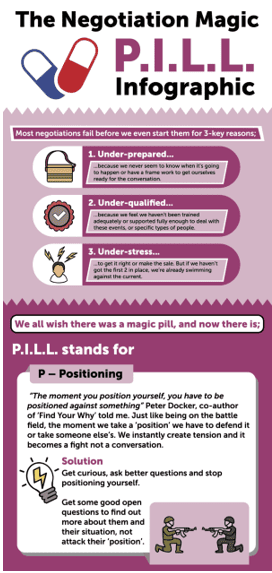
This Ultimate Guide to Negotiation Skills will take you through a structured methodology. Outlining and explaining as well as practically demonstrating the key behavioural strategies that trained and skilled negotiators may choose to adopt.
5) Negotiation Styles
#1- Confrontation
The other party may decide to be confrontational. That is, they use classic power-play tactics to undermine, discredit, disrupt and even destroy your planned selling (and sometimes) negotiating strategy.
This style is becoming less prevalent or subtly shifting. It would have been the ‘house’ style of most of the big 4 supermarket groups up to 5 or 6 years ago.
It’s a result of the introduction of legislation in the form of GSCOP and a number of high-profile scandals. Plus the fact that good suppliers with equally good training(!) were making it increasingly ineffective has meant as a result that most Buyers have moved on.
It is however still seen in ‘flashes’. How many times have you been to a meeting to be greeted by Mr. Jekyll who strangely morphs partway through the meeting into Mr. Hyde only to transition back to Mr. Jekyll by the end of the meeting?
#2- Manipulation
More commonplace these days is their use of Manipulative tactics and behaviours. Much more subtle, much more clever, sometimes even seen as corporately sponsored ‘fishing missions’:
‘We would like to invite our valued Supplier Partners to join us on the Escalator to the Starship to Growth 2018!’
A slick, professional, senior invite-only, ‘Supplier Briefing Conference’. And it’s hosted at some swanky location with lots of ‘Finest’ nibbles, a ‘Taste the Difference’ finger buffet and of course some ‘Extra Special’ Prosecco. It’s followed a few days later by the meeting that culminates in the humungous outrageous investment ‘Ask’.
#3- Collaboration
A cornerstone of the big multiples’ success at driving lower prices for customers whilst still driving corporate profits is their recognition that actually certain Suppliers at certain times actually help drive interest, innovation and excitement into their assortments. Therefore sometimes it is beneficial to adopt a collaborative approach to negotiation.
This is the world of the genuine JBP (one that actually has a J in it!). They see the value you bring to the category and their business and actively jump on board. They will actively seek to engage and work with you.
However, there are two critical things to remember when they adopt this approach. First, they are still out to transfer money from your business to their business and secondly, it won’t always last long.
Easter’s star supplier of Easter Eggs is unlikely to be the star of Christmas Chocolate Advent Calendars. It pays them to keep their Suppliers ‘churning’. It makes them more money, it keeps you unsure.
Free Ultimate Infographic for Negotiation Skills:
Take a look at our Negotiation Skills Ultimate Infographic below. Click the image below for a higher resolution:
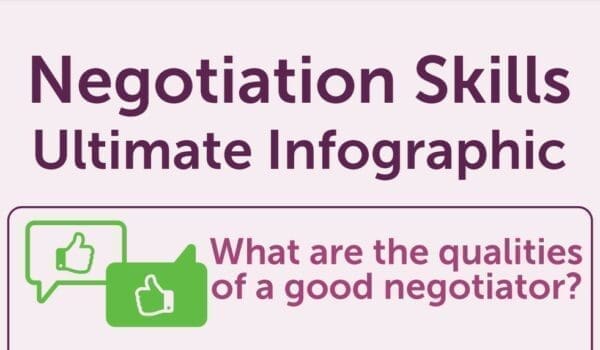
6) Effective Negotiation Techniques
To be effective in the world of supermarket negotiations. Just as with any negotiation you need to be planned and prepared. Not just organised and confident with the numbers but also with the tools to deal with the negotiation tactics and games they will deploy against you.
This Ultimate Guide will equip you with the good negotiation techniques required to get the best outcomes for your business. Thereby delivering a solid, measurable investment return on the training.
The Programme will expose all the different games and tactics that may be deployed against you whether they are intending to be Confrontational, Manipulative or Collaborative with you (or a mix of all three!).
#1- Dealing with ‘Games’
It will equip you with a robust, tried and tested process of negotiation and methodology to Recognise what is happening at any given point in the negotiation in order to diffuse that particular situation. Then Restore commercial logic and move the negotiation on to a positive conclusion.
Picture this. Your Buyer has kept you kicking your heels in reception for 45 minutes. They apologise that the booked meeting room is no longer available and say that you must set your carefully crafted and choreographed selling presentation up in the Canteen at 1 pm. They sit down in front of a window with the sun streaming right into your eyes. Then, they offer to get you a black tea that turns up as a white, sugared coffee and introduces you to his or her colleague – the forensic accountant. Who wants to have a ‘chat’ about promotional triggers going back 2 years? What do you do?
#2- Recognise, Diffuse and Restore
Therefore and hopefully, you have all Recognised what is going on. A classic physical power-play designed to be confrontational, disrupt your presentation and divert your focus and attention to their advantage.
As a delegate on the MBM Effective Negotiation Programme, you experience first-hand, via role plays, similar scenarios. You will be expertly coached about the appropriate response to diffuse and restore the situation. Remember it is almost always in your interest to keep the meeting going. Storming out is never an option and even a polite walking away is only in your interest very rarely. How many direct competitors do you have?
When you have practised and started to become comfortable with dealing with the negotiation tactics and games they will throw at you. Then we will introduce how to effectively prepare for the negotiation itself as the next step in how to improve your negotiation ability.
#3- The Value of Money
Therefore ask yourself the very simple question – how much is £20 worth?
A basic principle of effective negotiation is recognising the simple truth. Money is only ever worth the value printed on the note.
£20 is only ever £20!
Therefore if we try to negotiate with just money we are guaranteed to get very quickly into a complete and total Deadlock.
If we allow the negotiation to just focus on money itself a Buyers job is to get a £20 note off you for £10 or £5 or maybe even £2 in return! This is not an economically or commercially sustainable way of doing business for a supplier!
Not surprisingly what do you think Buyers are trained to go after first?
Correct – always the money!
Do they show a determined interest in your factory’s food safety accreditation? Do they want to know the financial health of your business? Or, are they after an in-depth understanding of the cost and production elements of your products?
No. They will always, if you let them go straight for the money.
Our UK supermarket wine buyer does not want to understand 200 years of French vinicultural history. The struggle the vines have in growing on the dry gravelly soils of the Gironde Valley is what makes the grapes (wine comes from grapes – really?!) so exclusive and so expensive.
No, they want alcoholic fruit juice that sells for a fiver a bottle but makes 35% margin!
How many Buyers for the top supermarket multiples in the UK do you think are Masters of Wine? The answer is not many!
7) Negotiation Techniques Tradeables
Click the image below for a higher resolution:
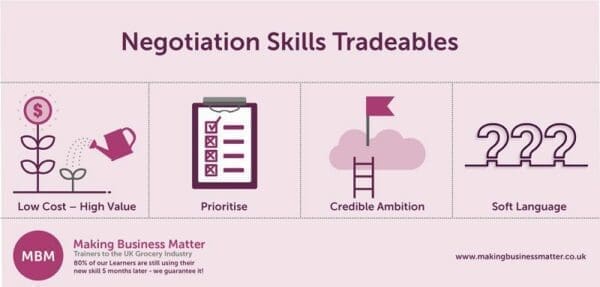
Therefore to effectively negotiate commercially profitable outcomes we must look to generate Tradeables. Those that have a differential cost and value to both sides.
#1: Low Cost – High Value
For instant cash in the till business like a supermarket, the cost of paying invoices early is very low. This is relative to a small cash-strapped producer who needs to regularly pay downstream suppliers for ingredients, materials, power, plant and light.
Therefore quicker payment terms for small suppliers is a Low-Cost Tradeable for a supermarket. But, it represents a sometimes lifesaving High-Value Tradeable to the Supplier.
Conversely, a period of exclusivity for a high-profile, innovative new product is a very High-Value Tradeable, especially to a young, ambitious Buyer in a supermarket that prides itself on the best new products. Therefore in some circumstances, especially if production is gearing up and full market supply may be limited then offering exclusivity to a particular supermarket group becomes a very Low-Cost Tradeable to the Supplier.
#2: Prioritise Your Tradeables
The MBM Effective Negotiation Programme will provide you with a cutting-edge, template framework to enable you to generate effective Low Cost, High-Value Tradeables.
It then shows you how to order and prioritise your Tradeables. And, how to plot out which stages of the negotiation to introduce them to gain maximum return for your business.
The Programme differentiates between different negotiation scenarios, from large-scale, multi-step and multi-level Organisational negotiations to Email and Telephone negotiations.
#3: The Importance of Ambition in Negotiation Skills
A critical element of any effective negotiation is ensuring you are credibly Ambitious throughout.
Imagine the scenario that you are selling your 3-year-old VW Golf with 30,000 miles on the clock privately. You want £5,000 for it, so what do you advertise it for? Well, advertise it for £5,000 and you won’t get £5,000. But advertise it for £15,000 and you won’t get a single call. However, advertise it for £5,995 and you have created yourself £995 of negotiation ‘wriggle room’.
Some negotiation courses talk about extreme opening positions. They tend to be the providers that train the Buyers! As you will see from the example, extremes don’t work if you are selling. You need to remain credible.
#4: Credible Ambition
Unfortunately, the world is not fair. What does the first professional motor trader say and do as they come to see your car? They suck their teeth. Take a sharp intake of breath, and sigh. Then tell you everything that is wrong with your pride and joy.
‘Well, it’s like this mate. ‘The alloys are shot’. ‘The colour is so last year and have you any idea how expensive it is to repair those dents!’ They take an impressive-looking bundle of tenners out of their back pocket. Then offer you a derisory but ‘because you seem like a decent fellow’ £500 for your car!
These extreme opening Buying positions are designed to shock, intimidate and hack away at your resolve. They don’t expect you to fold instantly to the ridiculously low £500. But they will see the doubt in your eyes and almost hear your thoughts…
‘Well, I’ve had no other calls’. ‘They are right I really should have done something about those alloys’. ‘And they have come a long way and do seem awfully nice, after all, they did call me Mate! So maybe I could probably drop my price by maybe a bit.’
They are now ‘in your head’, and they are in control of the negotiation. You need to recognise what is happening. Use the skills and techniques from the MBM Effective Negotiation Programme. Properly Diffuse the situation. Then adroitly Restore the negotiation to terms much more in your financial favour.
#5: Soft Language
An important element of becoming a skilled and effective negotiator is the ability to ‘read’ others. Therefore it is vital to be able to control yourself in any ‘soft’ language. It shows weakness or movement in your negotiation position.
‘My opening offer is £4,500 ish‘.
‘I could probably look at’.
‘The best price I can do now is between £3,500 and say £4,000?’
‘Shall we meet in the middle?’
Soft language is not just verbal. The negotiator leaned-back in their chair, arms behind their neck, looking relaxed and happy is not a negotiator being pushed to the limits of their planned negotiation zone!
Excuse the Interruption, but Here’s a Little Bit About Us…
We are the soft skills training provider to the UK Grocery Industry, helping Suppliers to win more business. They choose us because of our money-back guarantee, our relevant experience, and because we make their learning stick.

8) Negotiation Techniques for Account Managers
When negotiating with a supermarket buyer, you may need to adopt different techniques depending on the person, company or situation. We’ve pulled together a list of 50 useful negotiation techniques and strategies for account managers to use when negotiating terms.
Click on the image below for the full PDF or, alternatively, head over to our 50 negotiation techniques article for the full overview.
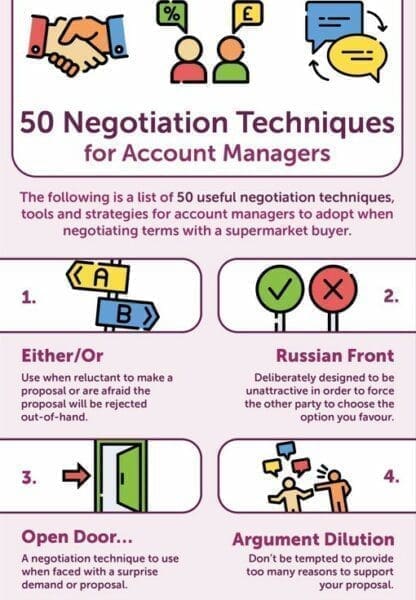
9) Our Conclusion
In conclusion, negotiation is an Art, not a Science.
Computers negotiate iteratively and hence will always come to the most logical, commercially equal, Win-Win outcome.
Therefore, the moment you bring humans into the equation the game changes. Human negotiators have good days and bad days. Some are honest, and some outright liars. They have prejudices, different levels of experience, different backgrounds and different approaches.
All in all, to be an effective negotiator you have to understand and embrace that human element. Therefore you need to recognise and understand the behaviours they adopt that underpin their negotiation approach. Thus, you must also have the skills to deal with those behaviours.
So you have dealt with the behaviours and have control of the negotiation. Then you need a properly thought through, planned, costed and sequenced set of negotiation Tradeables. These will allow you to efficiently engage with the other party to deliver the negotiation outcome that works for you principally but potentially the other side as well.
10) Further Negotiation Skills Reading and Resources
Finally, you can find further insight, detailed definitions and clarification of all the key Negotiation terms mentioned in this guide in our Negotiation Glossary.
#1- Read our Blog
Take a look at our award-winning blog and its content on Negotiation. Here are a few articles on this topic:
- Find the Meaning of Negotiation & What it Means to Negotiate.
- How Not to Prepare for a Negotiation.
- Great Negotiators Aren’t About Being Tough, Hard or Fist Banging.
- If You Then I – The Most Taught Negotiation Tool in the World.
- Conditioning is a Very Valuable Tool When Negotiating.
- Watch Live Examples of Good & Bad Negotiating.
- Negotiation Exercise: Can You Identify What They Did Wrong?
- 12 Ways to Improve Your Confidence in Negotiation.
- Negotiation Concession: Be Careful What You Give Away for Free.
- How to Do a Successful Salary Negotiation: End Up with More.
- How to Successfully Do Text Negotiation: Benefits and Pitfalls.
- How to Deal with Negotiation Stalemate With These 9 Tactics.
- Nick Kolenda’s Psychology of Negotiation Whitepaper.
- Book Review: The Negotiation Book by Steve Gates.
#2- Videos on Negotiation Skills
Also, subscribe to our YouTube channel, you can get a preview by starting with our playlist below on Negotiation Skills training:
